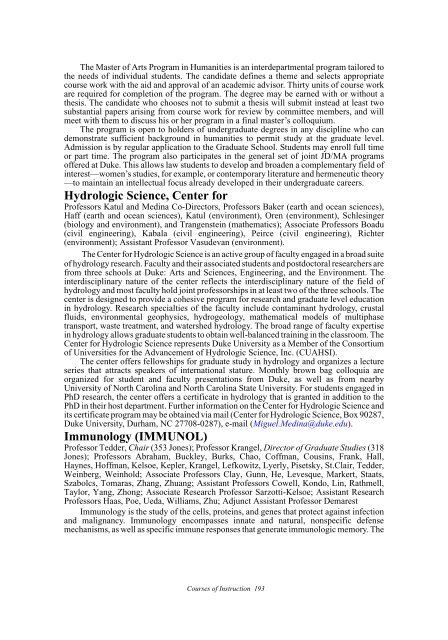Duke University 2008-2009 - Office of the Registrar - Duke University
Duke University 2008-2009 - Office of the Registrar - Duke University
Duke University 2008-2009 - Office of the Registrar - Duke University
You also want an ePaper? Increase the reach of your titles
YUMPU automatically turns print PDFs into web optimized ePapers that Google loves.
The Master <strong>of</strong> Arts Program in Humanities is an interdepartmental program tailored to<br />
<strong>the</strong> needs <strong>of</strong> individual students. The candidate defines a <strong>the</strong>me and selects appropriate<br />
course work with <strong>the</strong> aid and approval <strong>of</strong> an academic advisor. Thirty units <strong>of</strong> course work<br />
are required for completion <strong>of</strong> <strong>the</strong> program. The degree may be earned with or without a<br />
<strong>the</strong>sis. The candidate who chooses not to submit a <strong>the</strong>sis will submit instead at least two<br />
substantial papers arising from course work for review by committee members, and will<br />
meet with <strong>the</strong>m to discuss his or her program in a final master’s colloquium.<br />
The program is open to holders <strong>of</strong> undergraduate degrees in any discipline who can<br />
demonstrate sufficient background in humanities to permit study at <strong>the</strong> graduate level.<br />
Admission is by regular application to <strong>the</strong> Graduate School. Students may enroll full time<br />
or part time. The program also participates in <strong>the</strong> general set <strong>of</strong> joint JD/MA programs<br />
<strong>of</strong>fered at <strong>Duke</strong>. This allows law students to develop and broaden a complementary field <strong>of</strong><br />
interest—women’s studies, for example, or contemporary literature and hermeneutic <strong>the</strong>ory<br />
—to maintain an intellectual focus already developed in <strong>the</strong>ir undergraduate careers.<br />
Hydrologic Science, Center for<br />
Pr<strong>of</strong>essors Katul and Medina Co-Directors, Pr<strong>of</strong>essors Baker (earth and ocean sciences),<br />
Haff (earth and ocean sciences), Katul (environment), Oren (environment), Schlesinger<br />
(biology and environment), and Trangenstein (ma<strong>the</strong>matics); Associate Pr<strong>of</strong>essors Boadu<br />
(civil engineering), Kabala (civil engineering), Peirce (civil engineering), Richter<br />
(environment); Assistant Pr<strong>of</strong>essor Vasudevan (environment).<br />
The Center for Hydrologic Science is an active group <strong>of</strong> faculty engaged in a broad suite<br />
<strong>of</strong> hydrology research. Faculty and <strong>the</strong>ir associated students and postdoctoral researchers are<br />
from three schools at <strong>Duke</strong>: Arts and Sciences, Engineering, and <strong>the</strong> Environment. The<br />
interdisciplinary nature <strong>of</strong> <strong>the</strong> center reflects <strong>the</strong> interdisciplinary nature <strong>of</strong> <strong>the</strong> field <strong>of</strong><br />
hydrology and most faculty hold joint pr<strong>of</strong>essorships in at least two <strong>of</strong> <strong>the</strong> three schools. The<br />
center is designed to provide a cohesive program for research and graduate level education<br />
in hydrology. Research specialties <strong>of</strong> <strong>the</strong> faculty include contaminant hydrology, crustal<br />
fluids, environmental geophysics, hydrogeology, ma<strong>the</strong>matical models <strong>of</strong> multiphase<br />
transport, waste treatment, and watershed hydrology. The broad range <strong>of</strong> faculty expertise<br />
in hydrology allows graduate students to obtain well-balanced training in <strong>the</strong> classroom. The<br />
Center for Hydrologic Science represents <strong>Duke</strong> <strong>University</strong> as a Member <strong>of</strong> <strong>the</strong> Consortium<br />
<strong>of</strong> Universities for <strong>the</strong> Advancement <strong>of</strong> Hydrologic Science, Inc. (CUAHSI).<br />
The center <strong>of</strong>fers fellowships for graduate study in hydrology and organizes a lecture<br />
series that attracts speakers <strong>of</strong> international stature. Monthly brown bag colloquia are<br />
organized for student and faculty presentations from <strong>Duke</strong>, as well as from nearby<br />
<strong>University</strong> <strong>of</strong> North Carolina and North Carolina State <strong>University</strong>. For students engaged in<br />
PhD research, <strong>the</strong> center <strong>of</strong>fers a certificate in hydrology that is granted in addition to <strong>the</strong><br />
PhD in <strong>the</strong>ir host department. Fur<strong>the</strong>r information on <strong>the</strong> Center for Hydrologic Science and<br />
its certificate program may be obtained via mail (Center for Hydrologic Science, Box 90287,<br />
<strong>Duke</strong> <strong>University</strong>, Durham, NC 27708-0287), e-mail (Miguel.Medina@duke.edu).<br />
Immunology (IMMUNOL)<br />
Pr<strong>of</strong>essor Tedder, Chair (353 Jones); Pr<strong>of</strong>essor Krangel, Director <strong>of</strong> Graduate Studies (318<br />
Jones); Pr<strong>of</strong>essors Abraham, Buckley, Burks, Chao, C<strong>of</strong>fman, Cousins, Frank, Hall,<br />
Haynes, H<strong>of</strong>fman, Kelsoe, Kepler, Krangel, Lefkowitz, Lyerly, Pisetsky, St.Clair, Tedder,<br />
Weinberg, Weinhold; Associate Pr<strong>of</strong>essors Clay, Gunn, He, Levesque, Markert, Staats,<br />
Szabolcs, Tomaras, Zhang, Zhuang; Assistant Pr<strong>of</strong>essors Cowell, Kondo, Lin, Rathmell,<br />
Taylor, Yang, Zhong; Associate Research Pr<strong>of</strong>essor Sarzotti-Kelsoe; Assistant Research<br />
Pr<strong>of</strong>essors Haas, Poe, Ueda, Williams, Zhu; Adjunct Assistant Pr<strong>of</strong>essor Demarest<br />
Immunology is <strong>the</strong> study <strong>of</strong> <strong>the</strong> cells, proteins, and genes that protect against infection<br />
and malignancy. Immunology encompasses innate and natural, nonspecific defense<br />
mechanisms, as well as specific immune responses that generate immunologic memory. The<br />
Courses <strong>of</strong> Instruction 193









